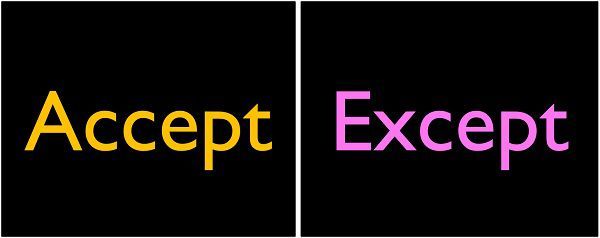 In English, the words accept and except sound a bit similar in pronunciation, but they are spelt differently. While accept in basic terms means ‘to agree with’ or ‘to hold certain proposition as true’. But when you talk about except, it means ‘not including’ or ‘other than’.
In English, the words accept and except sound a bit similar in pronunciation, but they are spelt differently. While accept in basic terms means ‘to agree with’ or ‘to hold certain proposition as true’. But when you talk about except, it means ‘not including’ or ‘other than’.
With the example given below, you might be able to understand the difference between accept and except clearly:
- The company accepted all the conditions of the workers, except the third one.
Here, all the conditions of the workers are agreed upon by the company but not the third one. To get a further understanding of the topic, read out the full article and use the two words wisely in your sentences.
Content: Accept Vs Except
Comparison Chart
| Basis for Comparison | Accept | Except |
|---|---|---|
| Meaning | Accept is an action word, which explains what an individual believes, or takes on. | Except is a conditional word that modifies a sentence, i.e. it restricts the meaning or area of a sentence. |
| Pronunciation | əkˈsɛpt | ɪkˈsɛpt |
| Part of speech | Verb | Preposition or Conjunction |
| Usage | It is used to show agreement. | It is used to highlight what is not included in the greater whole. |
| Example | Alex accepted the invitation to the award ceremony. | Except Alex, no one was interested in going to the award ceremony. |
Definition of Accept
Basically, accept means agreeing to or giving approval to something. It is used as a verb to show someone’s consent to an offer or invitation, to consider something as considerable, to believe some statement correct, to admit something.
One can use ‘accept’ in a sentence when he/she wants to give an affirmative answer to someone. Let’s talk how can we use accept in our sentences:
- To give consent to take something:
- Kindly accept the project work.
- I accept my mistake.
- To give an affirmative response to an offer or invitation:
- I accepted their proposal, for the movie.
- To give approval to something:
- Her application was accepted for the post of content writer.
- To hold or believe that something is true:
- This is something that I can’t accept.
Definition of Except
In simple terms, except means ‘other than’ or ‘excluding’, i.e. something which is not included in the given statement. It can be used as different parts of speech in a sentence.
When except is used as a preposition in a sentence, it shows the position of a specific thing with respect to another, and when used as a verb, it means exclusion from something. Come let’s understand how they are used in a sentence:
- As a preposition, it is used when we exclude something:
- I can go for the party anytime except on Sunday.
- Except for Alex, we all went to the circus.
- As a conjunction to connect two conditions in a sentence, and so, it refers to ‘however’ or ‘but’.
- All the dresses in this shop are good, except that blue one.
- To refer unless:
- I do not use cell phone, except if it is urgent.
Key Differences Between Accept and Except
The points given below are substantial so far as the difference between accept and except is concerned:
- The word ‘accept’ simply means ‘give consent to someone or something’, or ‘to receive something’ and so it denotes an action. As against, ‘except’ in basic terms means ‘other than’ or ‘apart from’, representing a condition in a sentence.
- We use accept mainly as a verb, whereas except is commonly used as a preposition or conjunction.
- One can use accept in the sentences where it is required to show agreement to something. Conversely, except can be used at the places where there is some kind of exclusion in a sentence, representing a condition.
- Example: The cricket team accepted the challenge.
Except for the captain, no other member of the team was ready for the challenge.
Examples
Accept
- People usually accept the rules and laws, but hardly follows them.
- The accused accepted his crime, in front of the Judge.
Except
- Indian Penal Code applies to all the states in India, except Jammu and Kashmir.
- The Chairman gave an invitation to all the members of the company, except the Managing Director.
How to remember the difference
A great tip to recognize the difference between accept and except is that Accept starts with the word ‘A’ and when you give an ‘A’ to something that means you agree to it or approve it. On the other hand, except starts with ‘ex’ which means excluding.






Leave a Reply